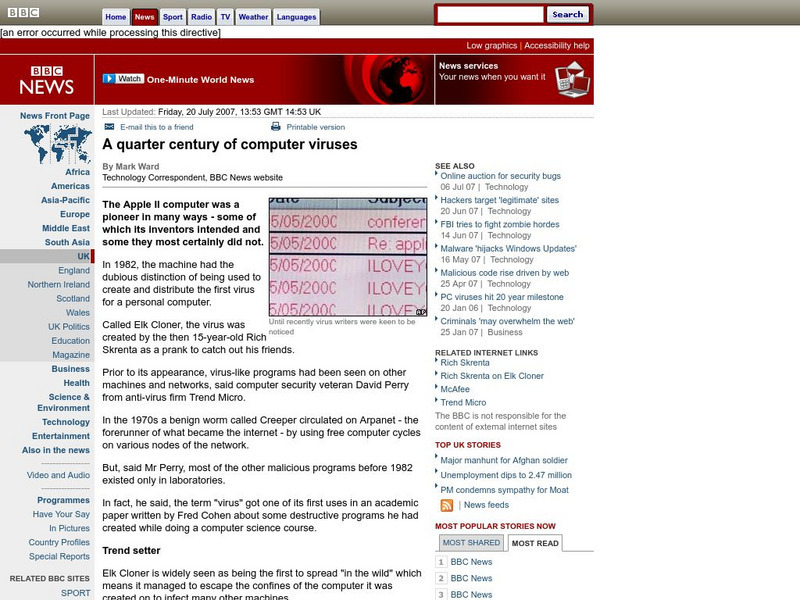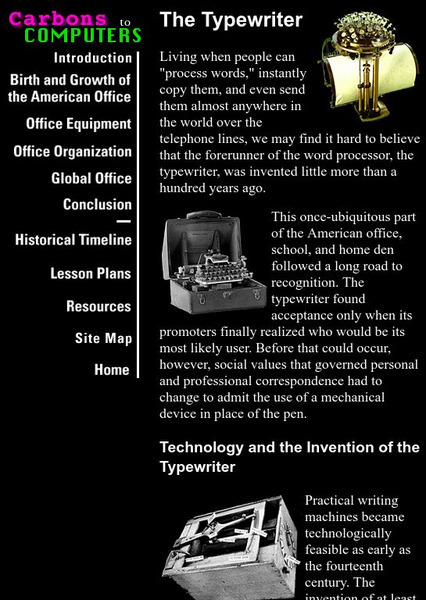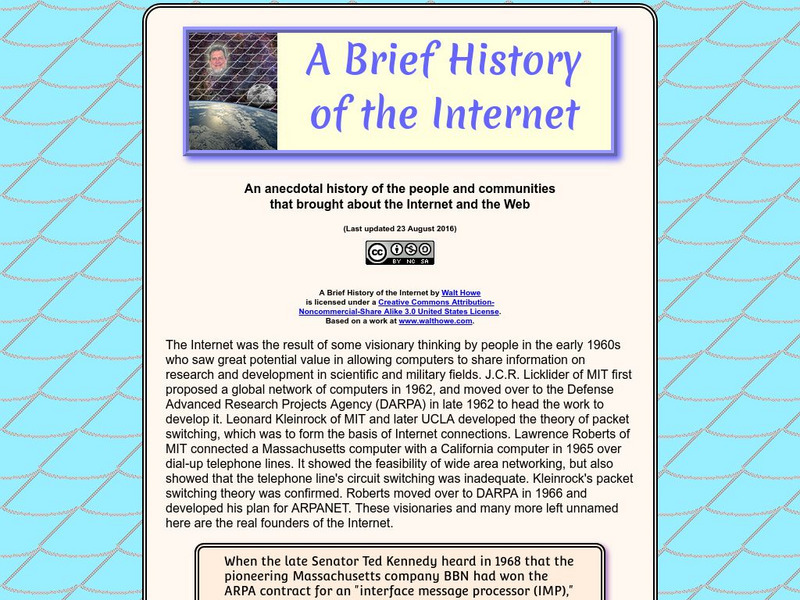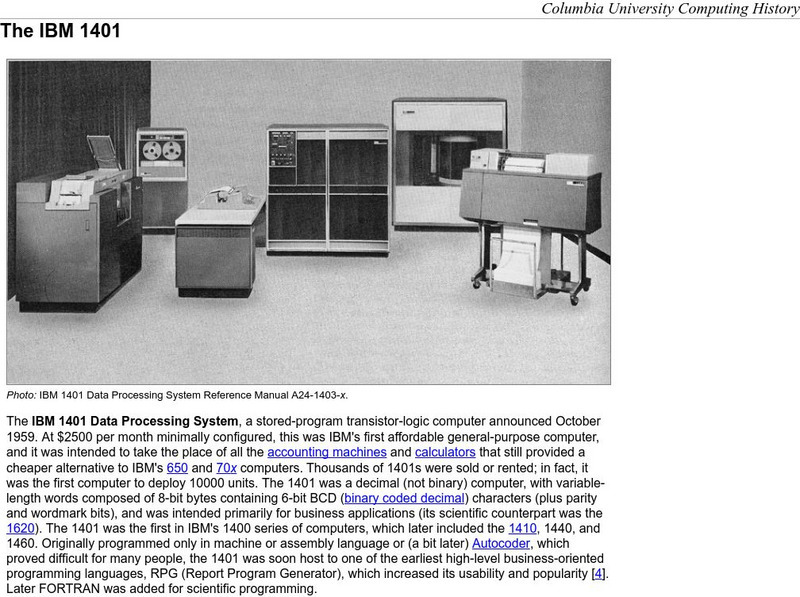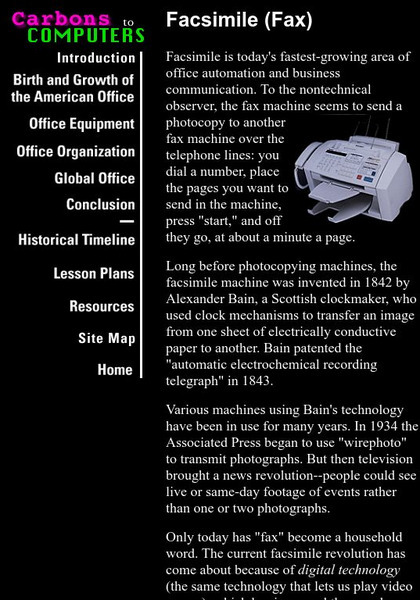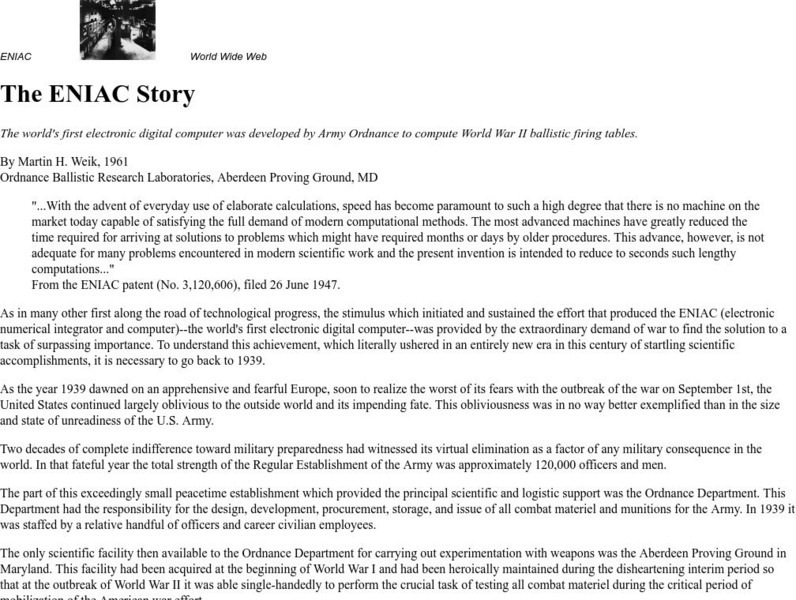The Franklin Institute
Franklin Institute: The Case Files: Early History of Computing
Computers are ubiquitous today. Step back in time and meet some of the early inventors of precursors to computers, and of the first computers.
Computer History Museum
Computer History Museum: Timeline of Computer History
This site presents an interactive timeline of computer development from 1939 through 1994. Upon selecting a year, the site presents all of the major computer hardware and software developments that occurred during that year.
BBC
Bbc: Science & Nature Hot Topics Computer Viruses
This BBC "hot topic" contains a description of the types of computer viruses. It also provides different ways to prevent or eliminate computer viruses.
Smithsonian Institution
Smithsonian Education: Carbons to Computers: The Typewriter
Created a little less than 150 years ago, the typewriter was the forerunner for the computer. This page offers a detailed history of the birth of the typewriter along with several visual examples.
TED Talks
Ted: Ted Ed: A Brief History of Video Games (Part I)
Video games are everywhere these days, but where did they actually come from? The history of video games is a complicated story that involves giant computers in science labs, the founder of Chuck E. Cheese and billions of dollars in...
University of Minnesota
University of Minnesota Charles Babbage Institute: Who Was Charles Babbage?
This is a biographical note on Charles Babbage, computer pioneer, and includes a list of his published works.
Computer History Museum
Computer History Museum: Integrated Circuits
Brief description on the design of Integrated Circuits along with images showcasing the assorted types. The various Integrated Circuit artifacts are on display at the Computer History Museum. This site provides a glimpse into the...
Harvard University
Harvard University: Howard Aiken: Makin' a Computer Wonder
About Howard Aiken's mission to build the first programmable computer.
Encyclopedia Britannica
Encyclopedia Britannica: 300 Women Who Changed History: Grace Murray Hopper
Encyclopaedia Britannica provides a biography of Grace Murray Hopper (1906-1992 CE), the noted mathematician, computer scientist, and military officer.
Computer History Museum
Computer History Museum: Charles Babbage
Considered by some to be the "father of the computer", Charles Babbage was a 'gentleman scientist'. Learn interesting facts about his personal life and his career.
National High Magnetic Field Laboratory
Magnet Academy: Magnetic Core Memory 1949
At the dawn of the computer age, magnetic core memory helped make data storage possible, and showed surprising staying power in a field where components are constantly being replaced by new and improved products.
Other
Internet Learning Tree: A Brief History of the Internet
An anecdotal history of the people and communities that brought about the internet.
National Women’s History Museum
National Women's History Museum: The Women of Nasa
Learn about the women who have played an essential role in the functions of NASA for almost a century.
Columbia University
Columbia University: The Ibm 1401
The IBM 1401 Data Processing System was IBM's first affordable general-purpose computer. It was introduced in 1959 and was IBM's first computer to sell over 10,000 units. This site describes the history of the 1401, the technology that...
Discovery Education
Discovery Education: Understanding Computing
This lesson provides activities to demonstrate how "A pebble calculator works in a way similar to an abacus," which will allow learners to increase their understanding of how computers work. The lesson also provides discussion prompts...
History of Computing Science
History of Computing Science: Harvard Mark I
The Harvard Mark I computer was the first large-scale automatic digital computer in the USA. This lecture provides a brief description of the Harvard Mark I computer.
Rock and Roll Hall of Fame
Rock & Roll Hall of Fame: Sti Lesson 15: The Changing American Landscape
The rise of American cities between 1865 and 1900 was spawned by the industrial revolution. Technological advancements in industry and transportation fathered the enormous growth of large cities across the United States. This led to the...
University of St. Andrews (UK)
University of St. Andrews: St. Andrews: History of the Four Color Theorem
The University of St. Andrews offers a brief history of the first math problem to be solved with computers.
History of Computing Science
History of Computing Science: Charles Babbage
This is a brief biography of Charles Babbage, also known as the "Father of Computing".
Smithsonian Institution
Smithsonian Education: Carbons to Computers Fax
The Smithsonian Institution provides the lifeline of the fax machine and of its uses in the business world.
Other
U. S. Army Research Laboratory: The Eniac Story
This site provides a detailed history of ENIAC, the world's first digital computer developed by Army Ordnance to compute World War II ballistic firing tables. Includes specifics on how the computer performed its calculations.
National High Magnetic Field Laboratory
Magnet Academy: Timeline of Electricity and Magnetism: 1940 1959
Defense-related research leads to the computer, the world enters the atomic age and TV conquers America.
National High Magnetic Field Laboratory
Magnet Academy: Timeline of Electricity and Magnetism: 1960 1979
Computers evolve into PCs, researchers discover one new subatomic particle after another and the space age gives our psyches and science a new context.
Science Buddies
Science Buddies: Taking Off on a Tangent
This is an interesting geometry project that goes back to the time of Archimedes, the famous Greek mathematician. You can combine this mathematical project with computer science and take this ancient problem into the twenty-first century...
Other popular searches
- Computers History
- Computer History
- "Computer Technology" History
- History of Computer Science
- The History of Computers
- Computer Science History
- History of Computers 1
- Computer History Webquests
- Apple Computer History
- Computer History Timeline
- Research Computer History
- Personal Computer History


